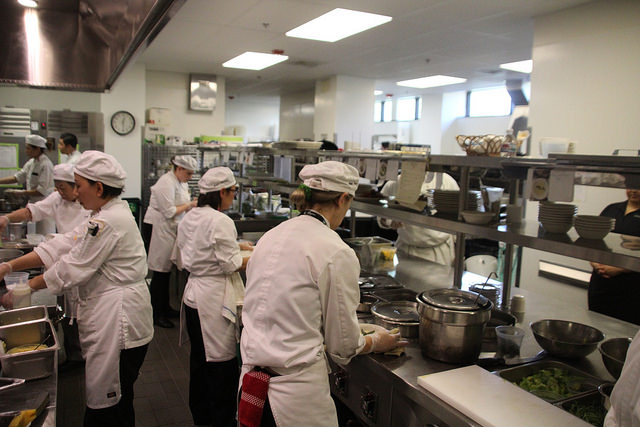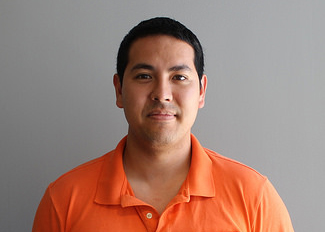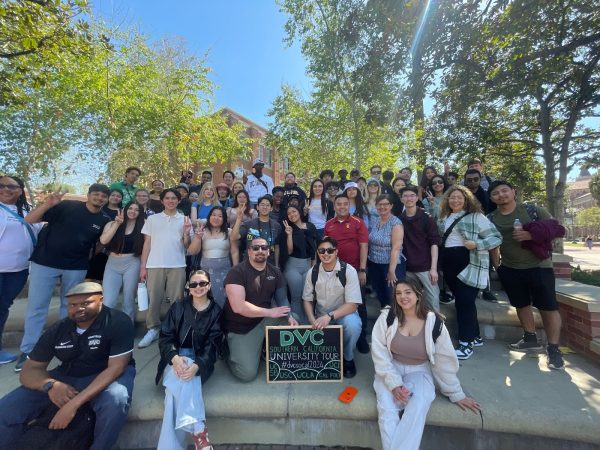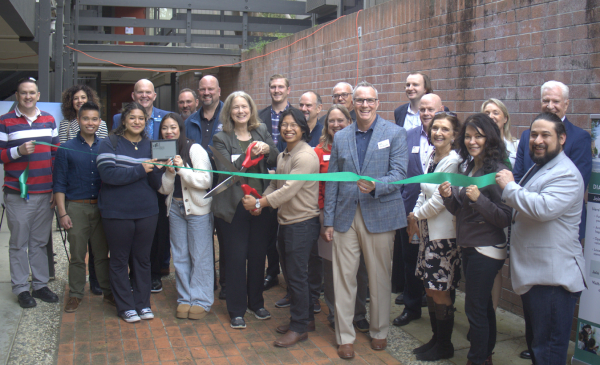Behind the scenes with DVC Culinary Arts
DVC Culinary Arts students cook lunch for the Norseman Grill on Wednesday, May 10. (Isaac Norman/DVC Inquirer)
May 15, 2017
Monday through Thursday Diablo Valley College student Michelle Brandt, 23, hospitality management major, rises at 4 a.m. to be on campus by 6:30 a.m.
With the exception of a few breaks, she’ll be in culinary arts classes until 8 p.m. when she will make the hour long drive back home.
On weekends she cooks at an assisted living home.
Michelle’s case is not unique either. Most students in the culinary program sacrifice their free time to work jobs in the industry when not in the classroom.
“You make the program into what you want it to,” says Lester Rodriguez, 27, baking & pastry major.
More than learning recipes and honing knife skills, DVC’s Culinary Arts Program prepares students for the challenges they will face in the food service industry.
Building the dedication and character needed to succeed in this fast paced industry is key to everything students do within these kitchens.
So are learning the essential skills unrelated to cooking.
Students also learn the intricacies of running the back end of a kitchen.
The first step to any successful meal starts before ingredients are purchased.
The program’s farm to table class teaches student show nutrients in the soil are transferred into food and eventually our bodies.
The class also teaches students what questions to ask when buying the food they will be feeding their customers.
Where did it come from? How long did it travel? How was it farmed or raised?
While buying the freshest, most nutrient rich and environmentally friendly produce can mean higher quality meals, customers can easily turn away because of the price.
Conversely cheap ingredients can lose customers if the food tastes bad. Poor quality can slao increase costs due to spoilage.
Buying closer to home means produce will last longer but may be harder to find and grown in smaller quantities than needed for a commercial kitchen.
Learning to balance these demands, a process known as purchasing and receiving, is essential to pleasing customers and maximizing profits and is at the heart of every restaurant.
“It’s where all the money comes in and all the money comes out,” says Ryan Howard, 23, hospitality major. “Without this there is nothing.”
For those who aren’t involved with cooking or purchasing and receiving, finding a way to contribute to the team often means cleaning.
It is perhaps the least glamorous, most essential task to the entire operation.
Finding thankless jobs liking mopping the floor or cleaning the grill are vital because every link is expected to work independently with minimal oversight and still be able to come together harmoniously to form a greater cohesive unit.
From busboys to wait staff to line cooks to management to executive chefs, the attitude and effort of everyone involved shines through in the food.
This then, is the most obvious lesson: teamwork makes the dream work.
Students learn to put their egos aside and be open to constructive criticism.
They learn to communicate amidst the noise and chaos.
They learn tricks of the trade in order to work smarter not harder and run the kitchen more efficiently.
They learn not to take things personally.
Working in a kitchen 12 hours a day, several days of the week can be stressful. Blowups happen. Yelling happens.
The key is for both parties to move forward because getting into an argument won’t get the food out any faster.
“Chefs will keep you if you can handle that stressful situation,” said Rodriguez.
What better place to learn that than in the kitchens at DVC?























































































During one lecture students lead a presentation on discipling employees and situations involving sexual harassment.
Bob Eustes, the faculty member in charge of the class, draws on over 20 years of experience in the industry to hammer home this point.
“You protect your employees as a leader and manager,” he said, “all it takes is one lawsuit, you want a nightmare, you got it.”